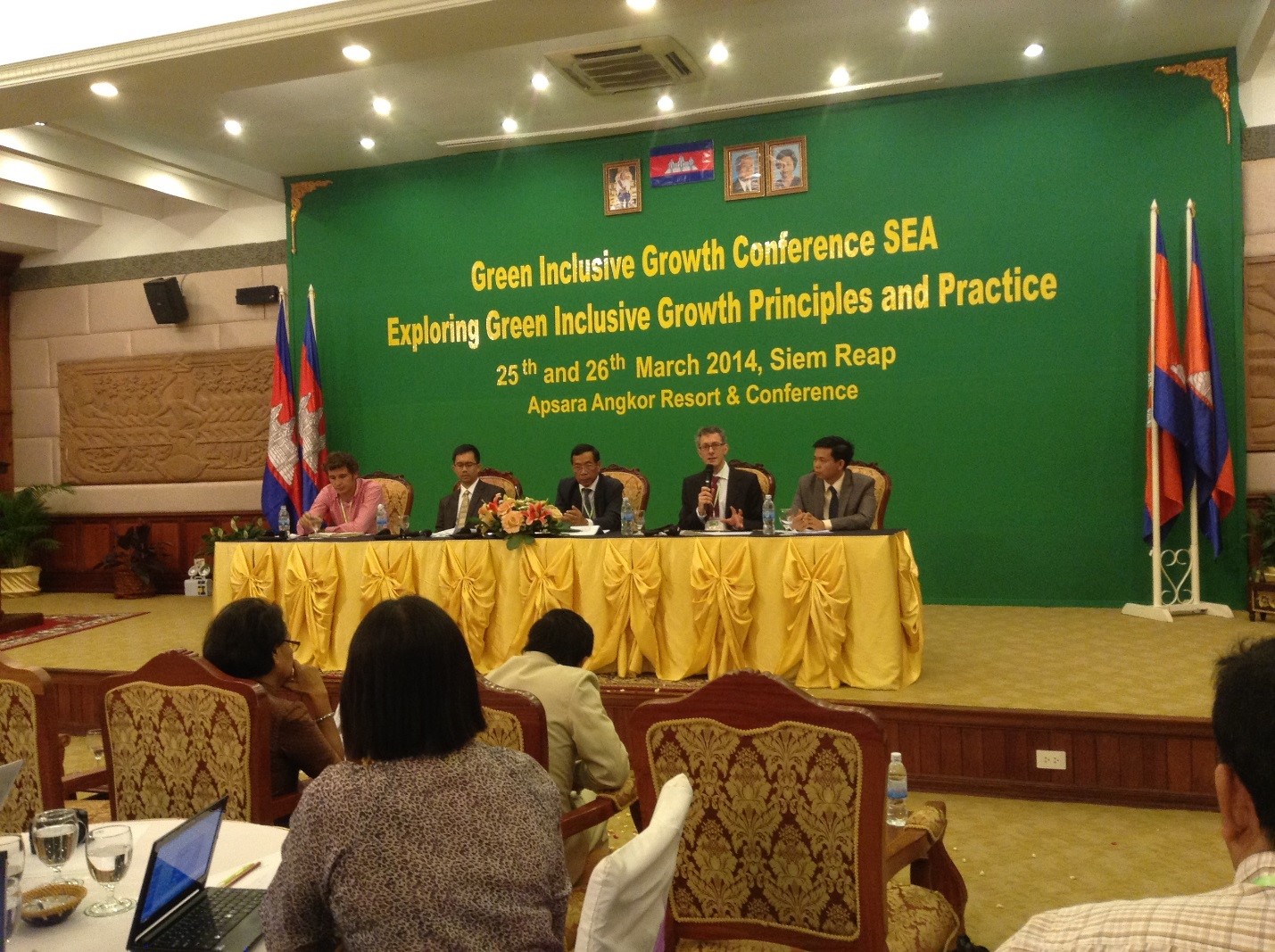
around80 participants from South East Asia (SEA) countries including Cambodia, Viet Name, Myanmar, Philippines and Timor Leste were assembled on March 25 and 26 for the Green Inclusive Growth Conference under the theme “Exploring Green Inclusive Growth Principle and Practice” at Angkor Paradise Hotel, Siem Reap.
Attending this event were H.E. Dr. Yin Kimsean, Secretary of State of Ministry of Environment, government representatives, policy makers, private sector, international NGOs, national NGOs, academia and industry experts, regional stakeholders as well as community representatives.
The Conferences aimed to help civil society groups and communities in SEA attain a better understanding of green growth which was promoted as a new policy paradigm for emphasizes ecologically sustainable economic progress that fosters low-carbon, socially-inclusive development. It also aimed to identity the stakeholders and ongoing initiatives and to examine progress in the implementation of Green Inclusive Growth in the region. It seeks to highlight who is benefitting and who is at risk of being excluded in order to inform policies and strategies, to facilitate dialogue between the public, privatization and tertiary sectors in order to support collaboration for inclusive green growth practices and initiatives in Southeast Asia and last of all to encourage as well as facilitate networking between industry stakeholders across the different verticals and sectors to promote future partnerships.
“Climate change has been recognized as a global issue putting at risk the livelihoods and security of millions of people. The results of the 1992 Rio Summit and other summits, Green Development have been used as a fundamental means in the world to deal with environmental challenges and play a core role in promoting a balance between development and economy, environment, society, and culture, which are the principle of sustainable development. In the Cambodian context, green development has become a new strategy that ensures harmonization between economic development and environmental sustainability and a balance between conservation and development”, said Tek Vannara, Executive Director of The NGO Forum on Cambodia.
He added that “in response to the tendency of global development, Cambodia, like other countries in Southeast Asia, has developed a national road map on green development to contribute to reduction of emission that causes climate change, to take into social inclusive economic development, and ensure sustainable development. This plan is require the collaboration in implementation from relevant stakeholders to achieve it.”
The interested parties joined together, in the course of this conference, to outline the key challenges, applications and practical implications of inclusivity in green growth initiatives and identify solutions, strategies together with innovations across a range of sectors to encourage inclusive growth. ClodaghByrne, SEA Regional Programme Manager for Livelihoods and DRR, CAFOD said, “Today we will be exploring Green Inclusive Growth from its concept to its practices. We will be learning from stakeholders across the SEA region, from indigenous communities, to local and national government to private sector about their visions of green inclusive growth. We will be seeing ‘on the ground’ initiatives which are improving peoples’ living condition and well-being in an inclusive and sustainable way. We hope to arrive at an understanding of what practical initiatives we would like to see current regional and national GIG policies supporting, sustaining and replicating on the ground.”
Upon the last conference occasion, the participants were able to gain valuable insight into emerging policies, and regional policies being implemented by government departments to drive forward sustainable green growth road maps, learned from local community stakeholders and CSOs about the practical implications of green growth initiatives on the ground, how they were benefiting and how could we ensure vulnerable groups were encompassed, received a holistic perspective of the opportunities and challenges for practical green growth strategies across a variety of sectors including water, energy, agriculture and economic lending, understood how multi-stakeholder platforms function and how they were driving forward GIG initiatives at all levels and finally be a part of the dialogue and exchange of ideas relating to real change in green initiatives to ensure inclusion of all affected parties and communities.